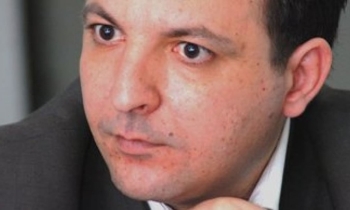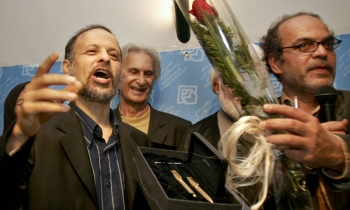Launching his speech by displaying the controversial cartoons of the prophet Muhammad, the Chairman of JP-Politikens Hus, a Danish media conglomerate, defended his paper’s decision to publish the caricatures, while criticizing U.S. papers for failing to republish them.
Chairman of JP-Politiken Hus, Joergen Ejboel, speaking at the National Press Club vspace=
Joergen Ejboel, speaking at the National Press Club in Washington, D.C., on April 11, insisted on his publication’s right to free speech in regard to the cartoons that sparked a wave of demonstrations and riots throughout the world last year; resulting in more than 100 deaths.
Ejboel dubbed the unrestricted freedom of speech as a “truth” that should not be compromised.
“A lot of people were offended by the truth,” said Ejboel, referring to a recent court decision of a libel suit filed by French Muslim organizations against the French newspaper Charlie Hebdo for republishing the cartoons.
“The truth can never be characterized as defamation,” he said, expressing discontent at the French judge’s usage of the word “offensive” when referring to the cartoons.
“If a cartoon can be legal in one context and a crime in another, then this will leave the door wide open to any group that can come forward and insist that any cartoon of their leader or hero amounts to defamation,” he told the audience at a lecture organized by the World Press Freedom Committee.
Defending his paper’s decision, Ejboel called for unrestricted freedom of speech with no “buts” and no “picking and choosing”.
The article accompanying the first publication of the cartoons in the Danish daily, Jyllands-Posten, in September 2005 explained: “Some Muslims reject modern, secular society. They demand a special position, insisting on special consideration of their own religious feelings. It is incompatible with secular democracy and freedom of expression, where one has to be ready to put up with scorn, mockery, and ridicule.”
Opponents of the cartoons said the caricatures were racist. Kuwait called them examples of "despicable racism," while Iran termed them "ridiculous and revolting," and the Organization of the Islamic Conference called them “blasphemous” and “insulting.”
Ejboel also voiced criticism of major U.S. newspapers for failing to republish the cartoons. “Contrary to major European papers, neither the New York Times, nor the Washington Post, nor the LA Times published any of the Muhammad cartoons to give their readers the opportunity to judge for themselves.”
Citing the slogan of the New York Times, “All the news that’s fit to print,” Ejboel argued, “It is hard to insist that the Muhammad cartoons were not news on February 1, 2006.”
Ejboel went on to say that it is hard for any newsman to produce a newspaper and not offend readers. “I can guarantee you that if you insist on not offending anyone and you do it consistently, you will not be able to fill all the pages of your paper.”
Responding to the defense of one American newspaper that argued it was unnecessary to print the cartoons because it was possible to describe their content using words, Ejboell stated:.
“Well, if this is the case there should not be any reason for publishing cartoons anymore, and your president should be very happy about this.” During his speech, Ejboell referred to cartoons depicting U.S. President George W. Bush as “the most evil, demeaning cartoons you can see in the whole world.”
“Why have photographs if you can describe everything in words?” Ejboell wondered.
Responding to a question from IJNet, the culture editor of Jyllands-Posten, Flemming Rose, who approved the commission and publication of the cartoons, explained he could not answer whether he would publish the cartoons again.
“This is a hypothetical question,” Rose told IJNet, adding that any answer he provided would receive criticism.
“I do not regret publishing the cartoons,” he said.









